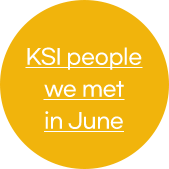
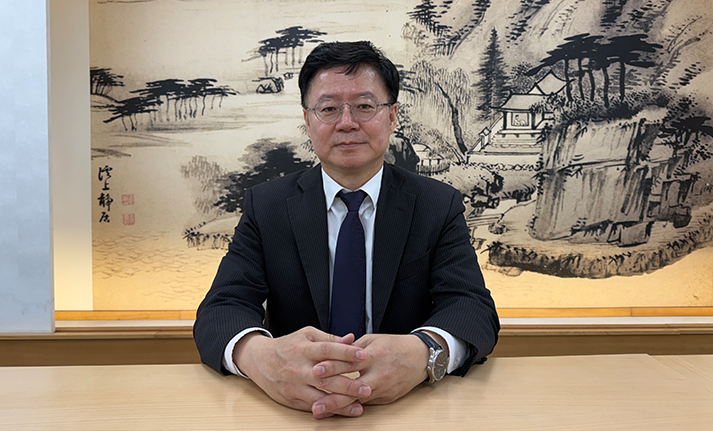
“We will widely promote the beauty and appeal
of the Korean language and culture.”
A Conversation with Director Lee Hae-don,
Participant of the 2025 KSI Workshop
in North America
Lee Hae-don, Director of the KSI Korean Cultural Center, Los Angeles, previously served as Director General for
Cultural Policy at the Ministry of Culture, Sports and Tourism. From June 11 to 13, he participated in the 2025
KSI Workshop in North America, engaging in in-depth discussions on the role and operational strategies of KSIs
in the region. We spoke with Director Lee Hae-don about his impressions of the workshop and his insights on
promoting the Korean language and culture throughout North America.
Hello, Director Lee Hae-don! It’s a pleasure to meet you. To begin, could you please briefly introduce
yourself to the readers of Monthly Knock Knock and tell us about the King Sejong Institute operated by the KSI
Korean Cultural Center, Los Angeles?
Hello. The KSI Korean Cultural Center, Los Angeles is an institution that provides Korean language education to
local residents in the southwestern region of the United States. In order to deeply understand and appreciate
the culture of another country, it is essential to learn the language that embodies its traditions, culture, and
sentiments. That’s why learning Korean serves as the first gateway to truly understanding and experiencing
Korea.
The Korean language courses at the KSI Korean Cultural Center, Los Angeles were first launched in November 1995
and have been operating under the name “King Sejong Institute (KSI)” since 2007. As demand for Korean language
education continues to grow in Los Angeles and neighboring areas, the program has steadily expanded. Currently,
there are nine classes offered across seven levels, ranging from beginner to advanced. While our learners have
diverse goals—such as communicating with family—they all share a strong interest in and affection for the Korean
language and culture.
Since the spring semester of 2020, we have also offered real-time online courses via Zoom, providing more
opportunities to students who previously had difficulty participating due to time or location constraints. In
addition, starting in the fall semester of 2021, we signed a memorandum of understanding with the KSI Center,
U.S.A., located in the LA Korea Center, to offer a combination of online and in-person classes. This
collaboration has laid the groundwork for the effective spread of Korean language education across the U.S.A.
Moving forward, the KSI Korean Cultural Center, Los Angeles will continue to collaborate with other Korean
language education institutions and utilize a variety of Korean cultural programs to actively promote and spread
the beauty and appeal of the Korean language and culture.
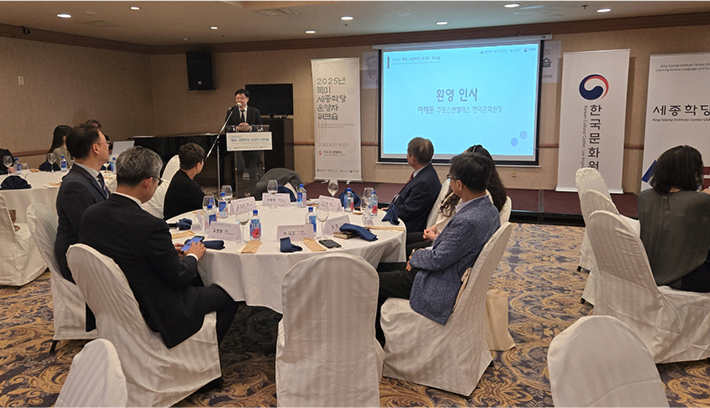 Director Lee Hae-don of the KSI Korean Cultural Center, Los Angeles delivers a welcome address at the 2025 KSI
Workshop in North America
Director Lee Hae-don of the KSI Korean Cultural Center, Los Angeles delivers a welcome address at the 2025 KSI
Workshop in North America
Before assuming your current role as Director, you served as Director General for Cultural Policy at the
Ministry of Culture, Sports and Tourism, overseeing Korean language promotion policies. Now that you've
transitioned from a policy-making position to the front lines of KSI operations, what has your impression
been, and how do you envision the direction of KSI management moving forward?
I served as Director General for Cultural Policy at the Ministry of Culture, Sports and Tourism for about one
year and two months, where I was responsible for widely promoting the identity, diversity, and excellence of
Korean culture. In particular, I oversaw Korean language-related policies and projects through the Korean
Language Policy Division. One of my main responsibilities was to support, manage, and supervise the KSIF, which
is in charge of spreading and teaching the Korean language abroad. Together with the KSIF staff, I worked hard
to find effective ways to respond to the growing global demand for Korean language education.
In Korea, my work focused on indirect tasks such as policy development, budget support, and organizational
management related to overseas Korean language education. However, here in Los Angeles, I’m directly involved in
on-the-ground operations—designing Korean language programs, assigning teachers, and managing learners. Through
this hands-on experience, I’ve witnessed firsthand the dedication of local learners in the U.S.A. and the
passion of Korean language teachers—something I hadn’t fully felt back in Korea. Many of our students attend
Korean language classes in the evening after finishing their work or school day. Watching them engage in
conversation during class, their expressions were both serious and joyful. Having struggled with learning
foreign languages myself as a student, I was genuinely impressed and a bit envious of how our learners are
enjoying learning Korean. I also felt proud of the KSI Korean Cultural Center, Los Angeles, for offering such
meaningful opportunities.
Going forward, we plan to develop and operate curricula, teacher placement strategies, textbooks, Korean
cultural experience programs, and a variety of activities tailored to learners’ needs—so they can learn Korean
more easily and over a longer period, while also deepening their love for the Korean language, culture, and
Korea itself. More than just a hobby or casual interest, we want learners to gain a deeper understanding of
Korean history and culture, and ultimately pursue meaningful Korea-related work. To that end, we will continue
to provide diverse and high-quality programs across various levels and fields through the KSI Korean Cultural
Center, Los Angeles.
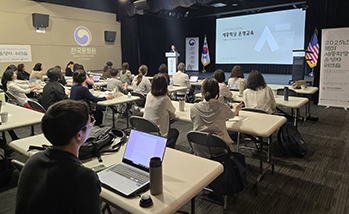
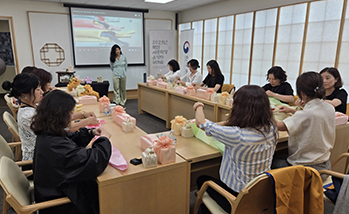
Programs at the 2025 KSI Workshop in North America
(From left) KSI Management Training, Korean Culture Teaching Methods and Practicum
You attended the 2025 KSI Workshop in North America, held from June 11 to 13. Was there a particular moment
from the workshop that stood out to you the most?
This workshop brought together more than 40 participants—including directors, staff, and teachers—from 13 KSIs
across North America. It was a valuable time of sharing and learning, as each KSI presented its operational
status, accomplishments, and challenges. While the founding background, circumstances, and difficulties varied
among the institutes, everyone agreed on two key points: the growing interest and preference for Korean language
and culture among local residents, and the increasingly favorable environment for Korean language education.
In light of this, the role and stature of KSIs must be further strengthened. I believe that to achieve this,
long-term and systematic local support and management from both the Korean headquarters and KSIF are essential.
In particular, there was a consensus that rather than a standardized, centralized management system led solely
by KSIF, we urgently need region-specific support and oversight centered around local KSI centers. Although the
schedule was short, it was a meaningful opportunity to directly hear and exchange candid, on-the-ground feedback
from local staff and teachers, as well as to gather ideas for improving the current system. It was truly a
valuable moment for reaffirming the direction and goals that KSIs should pursue in the future. One memorable
moment was at the end of the workshop, when each KSI’s name was written in Korean brush calligraphy and
presented as a hanging scroll. Seeing the participants light up with childlike pride and joy left a lasting
impression.
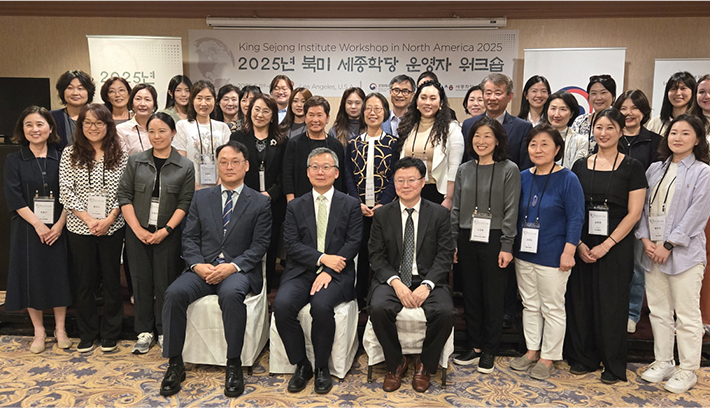 Group photo of participants at the 2025 KSI Workshop in North America
Group photo of participants at the 2025 KSI Workshop in North America
How do you view the current demand for Korean language and culture in North America? We’d also love to hear
your thoughts on the roles that the Korean Cultural Center and KSI should play to further expand this demand.
The Korean Wave in North America is just as vibrant and rapidly growing as in other regions. While interest
initially centered around teenagers and Korean pop culture, it has recently expanded across various sectors and
age groups. Interest in K-pop, dramas, and films is evolving from a passing trend to a broader and more
sustained curiosity about Korea and Korean culture as a whole. This growing demand represents a meaningful
opportunity to introduce Korea and its culture in a deeper and more accurate way to local audiences.
Within this context, if the Korean Cultural Center and KSIs can develop and implement diverse programs and
initiatives that reflect the authenticity, identity, and excellence of Korean culture—tailored to local
needs—they are likely to be well received. It’s important to introduce programs that represent the core of
Korean identity and characteristics, including traditional culture and rituals, fine arts, everyday lifestyle,
humanities, and religion, while also offering practical opportunities for local people to enjoy and experience
these elements in their daily lives. To achieve this, we must build and maintain strong, ongoing networks with
mainstream institutions and figures in North America—such as government agencies, schools, law enforcement, and
arts and cultural organizations. Furthermore, the Korean Cultural Center and KSIs should strengthen their
collaboration as key overseas platforms for Korean cultural exchange and outreach. By fulfilling their
respective professional roles and sharing resources, they can create powerful synergies and maximize their
collective impact.